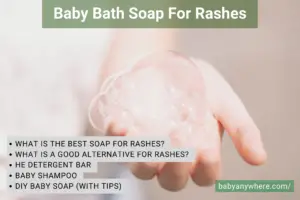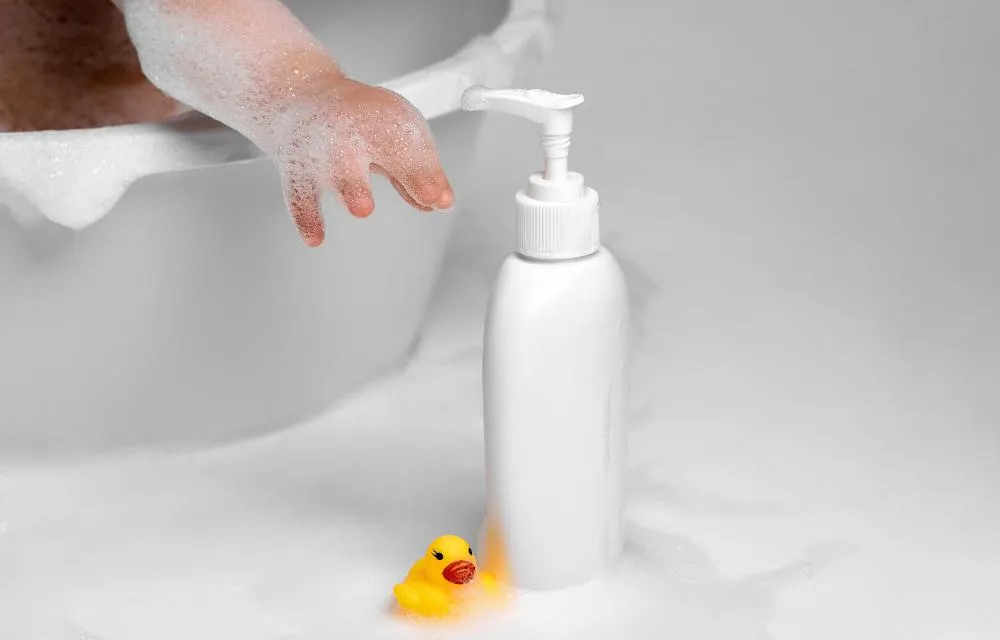There are several reasons why your baby might be itchy. Environmental triggers like pollen, dust mites or mold, and even the baby’s sensitive skin can lead to a rash. Some babies have eczema or a seborrheic dermatitis-like condition that causes red, scaly patches of skin. These conditions cause irritation to your baby’s skin and make it itch without any apparent reason. To prevent your baby from developing a permanent case of diaper rashes, you need to keep their skin moisturized at all times with suitable baby soap for eczema.
Keeping your baby’s sensitive skin clean will go a long way in preventing rashes from developing. What you choose to use as the soapy solution for your little one will depend on their current situation and what has worked best for them in the past. There are several soaps and cleansers available on the market today that can help keep your child’s eczema under control but not all of them are suitable for all babies with sensitive skin. Read on to learn more about how to keep your baby’s rashes at bay while keeping their diaper area as clean as possible…
What Is The Best Soap For Rashes?
The best soap for rashes is one that is fragrance-free, hypoallergenic, and organic. It needs to be able to penetrate the skin without leaving a residue and not cause any irritation. There are also ingredients like ceramides, lactic acid, and natural oils that help moisturize your baby’s skin.
You should use soap that has been approved by the FDA as well as dermatologists. If you are unsure about what type of soap will work for your baby, ask your pediatrician or a caregiver in stores for recommendations.
What Is A Good Alternative For Rashes?
Some people believe that the best alternative for rashes is to use a medicated ointment. However, some babies are sensitive to these products and can develop an adverse reaction, so it’s important that you do your research before making a decision on what will work best for you and your baby. Medicated ointments come in all shapes and sizes with differing ingredients and can range from $5 to more than $100, which could be a significant cost when you factor in how often they must be purchased.
HE detergent bar
The most common solution for rashes is he detergent bar. HE detergent bars are designed specifically for babies with sensitive skin and are more gentle than other soaps. They can help keep your baby’s skin moisturized, clean and prevent future rashes from developing.
Instead of using a pump or a bottle, you can use a bar soap to simplify the process of bathing your baby. What is great about these soap bars is that they come in different shapes and sizes; it makes them easy to grab and handle without making a mess. The soft, malleable nature of the soap means that you will not have to worry about hurting your little one while they are taking their bath.
Baby Shampoo
Baby shampoo is a great option for cleansing baby’s skin. Baby shampoo typically has less harsh ingredients than adult shampoos that can cause irritation or dryness of the skin, especially on sensitive areas like the eyes. Plus, baby shampoo smells good and often comes with an added benefit like a lathering bubble bath to keep your little one clean and soothed while they sleep.
If you find that baby soap isn’t working well enough for your particular situation, then you might want to switch to a different type of soap or shampoo with softer ingredients. If you have an especially itchy rash that seems to be getting worse despite using baby-safe soap, then it’s time for you to consult a doctor for advice about what might be causing their flare-ups.
DIY baby soap (with tips)
There are several ways to make your own baby bath soap, but they all involve the use of a bar soap. Some people recommend using a special soap made specifically for babies with sensitive skin.
Tip #1: Opt for unscented baby soap
If you want to avoid unnecessary chemicals in your home, opt for unscented baby products. There are many different scents that can be used to make homemade baby soaps, but none of them should include any added fragrances unless you test the soap on your child first and know it is safe.
Tip #2: Add different ingredients to give your baby’s skin a boost
Instead of just adding one type of moisturizer or oil into your homemade soaps, use ingredients like coconut oil, olive oil, and shea butter as well. These oils will provide moisture to the skin while giving a gentle scent at the same time.
Tip #3: Make sure you have enough kitchen space
It is easy to make homemade soap at home if you have an adequate supply of kitchen space and fresh ingredients on hand. If not, consider buying some commercially available baby bath soaps and creating your own concoction from there.
Bottom Line
If your baby has sensitive skin, you need to use a soap that is suitable for their condition and needs.
Baby Bath Soap For Eczema
There are several reasons why your baby might have rashes- environmental triggers like pollen, dust mites or mold, and even the baby’s sensitive skin can lead to rash. Some babies have eczema or a seborrheic dermatitis-like condition that causes red, scaly patches of skin. These conditions cause irritation to your baby’s skin and make it itch without any apparent reason. To prevent your baby from developing a permanent case of diaper rash, you need to keep their skin moisturized at all times with suitable baby soap for eczema.
Keeping your baby’s sensitve skin clean will go a long way in preventing rashes from developing. What you choose to use as the soapy solution for your little one will depend on their current situation and what has worked best for them in the past. There are several soaps and cleansers available on the market today that can help keep your child’s eczema under control but not all of them are suitable for all babies with sensitive skin. Read on to learn more about how to keep your baby’s rashes at bay while keeping their diaper area as clean as possible…
FAQ’s
What are the causes of a baby’s itchy skin?
Diaper rashes are the most common type of rash in infants and toddlers. Their cause is not well understood, but they can be complicated by bacteria, yeast and fungi. Diaper rash may itch, burn or become red and tender. They can appear on the bottom of the baby’s buttocks, thighs or thighs and on the genitals. They usually clear up in a few days without treatment. If they don’t clear up or get worse, your doctor may prescribe a mild steroid cream or anti-fungal cream.
Baby soaps are not recommended for bathing your baby because they are too harsh for delicate skin and can irritate their skin. Instead, you can use pure gently scented baby wash for bathing your baby to prevent diaper rash. Baby soap will not only help keep their skin free from dirt and germs, but also help improve their skin’s moisture level to healthy levels to prevent diaper rash from developing.
How can you prevent your baby from developing permanent cases of itchy skin?
Itchiness is a common complaint among babies and there are many, many possible causes. It’s best to take your baby’s temperature, and if it’s above normal it’s time to get checked out by a doctor. The best treatment is Prevention!
It starts with baby soap. Try Babyganics oatmeal soap, it is free of artificial colors and fragrances. Use it on your baby’s face, hands and body to prevent diaper rash and skin irritation. Rinse well with warm water but don’t scrub! There are many diaper rash creams on the market – try Baby unting stamp pad cream, which is hypoallergenic. Wash your baby’s bottom well with rinse water after a bowel movement or blowout. Don’t use powder or talc! It clogs the pores in the area that can lead to irritations like diaper rash. Sterile wipes are great for quick clean ups when you can’t get to a toilet quickly like when you’re out and about.
Another big ingredient in preventing rash is proper hydration of your baby’s skin – be sure they drink plenty of fluids while they’re awake (babies are around 80% water so try not to skip that) but also make sure you’re giving them some good quality infant formula (if needed) or breast feeding (if possible). Also try adding some extra zinc to their diet – zinc deficiency can cause eczema in babies and early life zinc deficiency has been linked to eczema/eczema-like conditions later on in life so it probably isn’t a bad idea if they’ve got eczema or hay fever as an adult!
What are the effects of keeping your baby’s skin clean?
There are several reasons why your baby might be itchy. Environmental triggers like pollen, dust mites or mold, and even the baby’s sensitive skin can lead to a rash. Some babies have eczema or a seborrheic dermatitis-like condition that causes red, scaly patches of skin. These conditions cause irritation to your baby’s skin and make it itch without any apparent reason. To prevent your baby from developing a permanent case of diaper rashes, you need to keep their skin moisturized at all times with suitable baby soap for eczema.
Keeping your baby’s sensitive skin clean will go a long way in preventing the development of a rash. Wash their hair and body with mild, pH-balanced soap as often as they need it to keep their skin irritation at bay. Keep their room and bedding free of dust mites with a vacuum cleaner. If they do develop a rash, use only gentle products such as oatmeal bath or lotion to soothe the red patches and dry patches on their skin. The acidic nature of milk can also lead to eruptions in babies’ sensitive skin if their diet includes too much processed foods such as milk.
It is not necessary for you to change your baby’s diapers all the time since frequent changes can lead to irritation and rashes in their sensitive skin. Using a disposable diaper covers when they are out of the house is one way you can ensure that their bottom stays dry at all times while still keeping them free of discomfort during outings.


“
“

